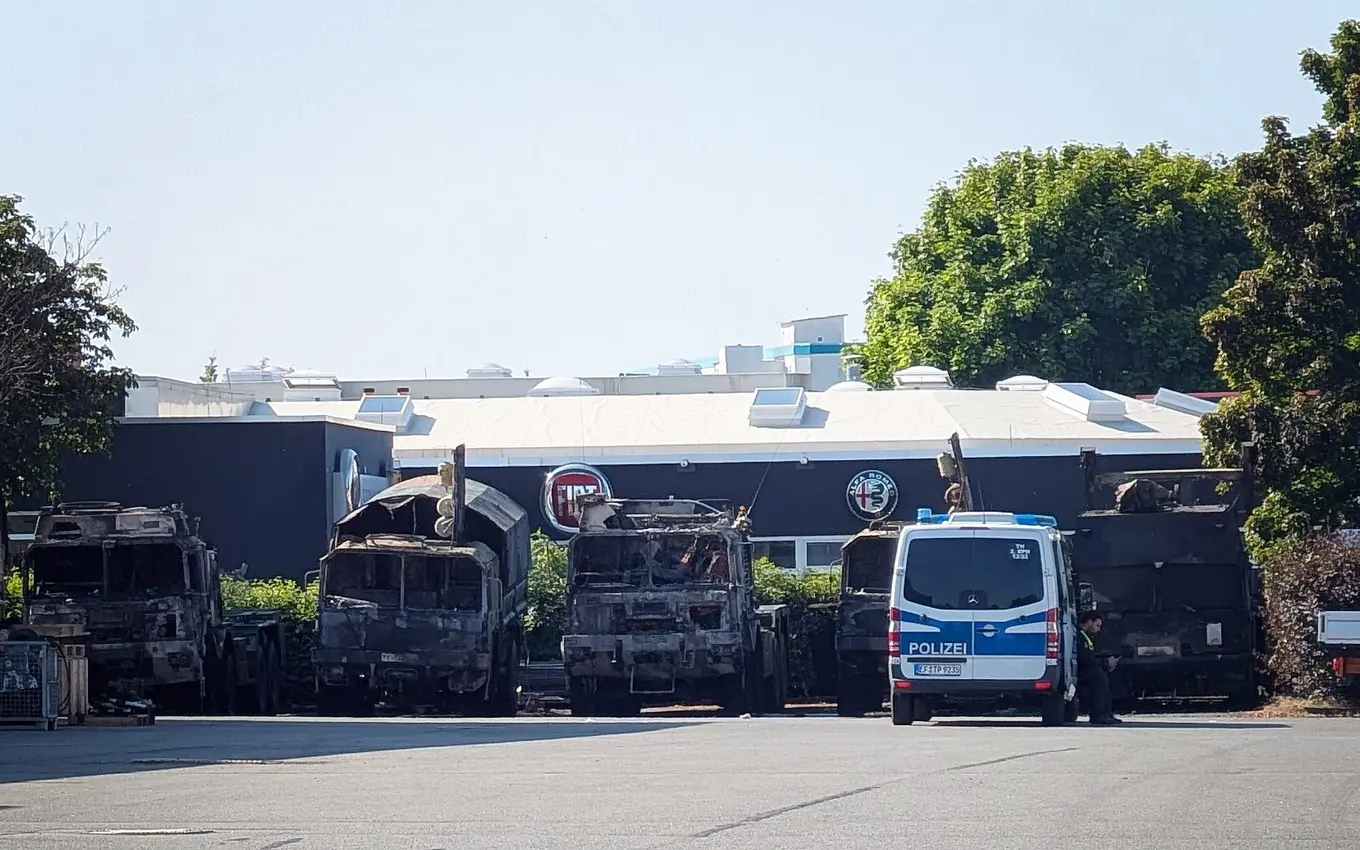Germany is facing another scandal involving its military infrastructure. On Saturday night, six Bundeswehr trucks went up in flames at a repair yard in the city of Erfurt. What initially appeared to be a routine act of vandalism quickly turned into an international mystery. Days after the blaze, a Russian-language Telegram channel published a video purportedly showing the arson in progress. The caption suggested Russian involvement, prompting German investigators to consider the possibility of foreign sabotage.
According to the Erfurt public prosecutor’s office, investigators are not ruling out the possibility that Russian operatives may have had a hand in the incident. “We are also pursuing this line of inquiry,” said a spokesperson for the prosecutor’s office. However, authorities emphasize that all directions are being considered.
What Happened?
Six Bundeswehr trucks caught fire on Saturday evening while parked at a military workshop in Erfurt. Military police (Feldjäger) were immediately dispatched to the scene, joining local investigators. A few days later, a video surfaced on a Russian-language Telegram channel, showing both the intact trucks and the ensuing blaze. Prosecutors believe the footage may depict the early stages of the arson attack.
The origin and authenticity of the video are currently being examined by the Thuringian State Criminal Police Office (LKA). Authorities are also working to identify the individual or group behind the Telegram post.
What Does the Telegram Post Say?
The Russian-language caption accompanying the video is both politically charged and ominous:
“In Erfurt, Germany, various military equipment is being repaired for the Ukrainian armed forces. Our people decided this was unnecessary, and that the Ukrainian military didn’t need such equipment. So, they simply burned it.”
The statement appears designed to appeal to a pro-Russian audience while undermining Germany’s support for Ukraine. However, Berlin quickly responded: according to the German Ministry of Defense, the destroyed trucks were not destined for Ukraine. “These are basic tools for the troops,” said a spokesperson in Berlin. “There is no connection to any transfers to Ukraine.”
Speculation or Sabotage?
The Bundeswehr’s regional command in Thuringia confirmed awareness of the video but urged caution. “From our current perspective, this is still purely speculative — whether this was a sabotage act by pro-Russian actors or simply part of a disinformation campaign,” a military spokesman said. The Bundeswehr will not engage in speculation.
Yet the incident is causing growing concern. Thuringia’s Interior Minister, Georg Maier, issued a strong statement about the possibility of foreign interference:
“If it turns out that a foreign power — such as Russia — deliberately carried out sabotage here, then this is once again an attack on our democracy. I condemn such hostile acts on German soil in the strongest possible terms.”
Not the First Time
This is not the first such attack. The same location in Erfurt was targeted last June, when military vehicles were also set ablaze. At the time, little information was released, but investigators now admit that they are sharing intelligence across Germany regarding similar incidents.
In March, several Bundeswehr vehicles were torched in Berlin. Just two weeks ago, another six military trucks went up in flames in Soltau, Lower Saxony. As in Erfurt, the trucks were parked on workshop grounds.
The Soltau incident was followed by a “claim of responsibility” letter posted on the far-left Indymedia platform. A group calling itself “Agenda2029” wrote:
“A further escalation of a global war is being prepared here in Germany, and so we must sabotage the centers of those fueling it.”
This statement, which appears to be ideologically motivated, has led some observers to suspect a broader campaign of sabotage — possibly coordinated, possibly not. Whether the same perpetrators are behind all the incidents remains unclear.
Verdict? Not Yet.
As of now, no firm conclusions have been drawn. The video’s authenticity is still under review, and authorities continue to investigate the origins of the Telegram post. However, the broader context — repeated arson attacks, political messaging, and foreign-language propaganda — suggests that the Erfurt fire may be more than an isolated crime. It could be part of a larger campaign involving sabotage or psychological warfare.
According to NZZ, the investigation is walking a fine line between identifying domestic extremist threats and uncovering possible foreign interference. Although no direct accusations have been made against Russia, German officials are clearly considering that possibility — and preparing for serious consequences.
This article was prepared based on materials published by Neue Zürcher Zeitung. The author does not claim authorship of the original text but presents their interpretation of the content for informational purposes.
The original article can be found at the following link: Neue Zürcher Zeitung.
All rights to the original text belong to Neue Zürcher Zeitung.


















